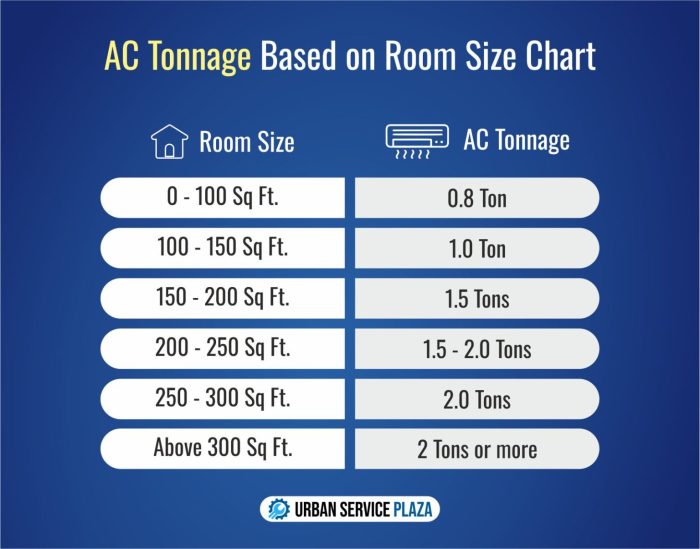Embarking on the journey of selecting the perfect AC for your home size involves various considerations and factors that play a crucial role in ensuring optimal cooling efficiency. From understanding the importance of home size to exploring different types of air conditioners, this guide aims to provide you with valuable insights to make an informed decision.
As we delve deeper into the realm of AC selection, you will uncover essential information on energy efficiency ratings, installation considerations, and practical tips that will guide you towards choosing the most suitable AC for your living space.
Considerations for Home Size
When choosing an AC for your home, one of the most important factors to consider is the size of your home. The square footage of your living space plays a crucial role in determining the right AC unit for your needs.
Let's delve into why home size matters and how it impacts your AC selection.
Impact of Square Footage
The square footage of your home directly influences the cooling capacity required from an air conditioner. A larger home with more square footage will need a higher capacity AC unit to effectively cool the entire space. Conversely, a smaller home will require a smaller capacity AC unit to efficiently cool the area without unnecessary energy consumption.
Relationship between Home Size and AC Capacity
The relationship between home size and AC capacity is straightforwardthe larger the home, the higher the AC capacity needed. Oversized AC units in small homes can lead to inefficient cooling and increased energy costs, while undersized units in larger homes may struggle to maintain a comfortable temperature.
It is essential to match the AC capacity with the square footage of your home to ensure optimal performance and energy efficiency.
Types of Air Conditioners
When it comes to choosing the right air conditioner for your home size, it's important to consider the different types of AC units available on the market. Each type has its own set of advantages and disadvantages, making it crucial to pick the one that best fits your needs.
Central Air Conditioning Systems
Central air conditioning systems are a popular choice for larger homes. They work by distributing cool air through a system of ducts and vents, providing consistent temperature control throughout the entire house. Here are some pros and cons to consider:
- Pros:Central AC systems are efficient at cooling large spaces, provide even cooling throughout the house, and can improve indoor air quality with proper filtration.
- Cons:Installation can be costly, especially if ductwork is not already in place. Maintenance and repair costs can also add up over time.
Ductless Mini-Split Systems
For smaller homes or spaces where ductwork is not an option, ductless mini-split systems offer a practical solution. These systems consist of an outdoor compressor unit and one or more indoor air handlers, allowing for customizable cooling in different zones of the house.
Here are some advantages:
- Pros:Ductless mini-splits are energy-efficient, easy to install, provide zoned cooling for personalized comfort, and are quieter compared to traditional AC units.
- Cons:Upfront costs may be higher than window units, and the indoor air handlers can be visible on the walls, affecting aesthetics.
Energy Efficiency Ratings

When choosing an air conditioner for your home, one crucial factor to consider is its energy efficiency. Energy efficiency ratings, such as the Seasonal Energy Efficiency Ratio (SEER), play a significant role in determining how much energy an AC unit consumes.
The Significance of SEER Ratings
The SEER rating indicates the efficiency of an air conditioner. The higher the SEER rating, the more energy-efficient the unit is. For example, a unit with a SEER rating of 16 will consume less energy than a unit with a SEER rating of 10 when cooling your home
Impact on Cost Savings
Energy efficiency directly impacts long-term cost savings. While energy-efficient air conditioners may have a higher upfront cost, they can save you money on your energy bills over time. By choosing a unit with a high SEER rating, you can reduce your energy consumption and lower your utility expenses.
Comparison of AC Models
| AC Model | SEER Rating |
|---|---|
| Model A | 14 |
| Model B | 18 |
| Model C | 20 |
By comparing different AC models based on their SEER ratings, you can make an informed decision on which unit will provide the best energy efficiency for your home.
Installation Considerations

When it comes to installing an air conditioner in your home, there are several key considerations to keep in mind to ensure optimal performance and efficiency.
Assessing Installation Requirements Based on Home Size
- Consider the square footage of your home to determine the cooling capacity needed for the AC unit.
- Take into account the layout of your home, ceiling height, insulation, and any factors that may affect airflow.
Importance of Proper Sizing and Placement of AC Units
- Proper sizing ensures that the AC unit can effectively cool your home without wasting energy.
- Placement of the AC unit is crucial for even distribution of cool air throughout the space.
Professional Installation for Optimal Performance
- Professional installation ensures that the AC unit is correctly sized and positioned for maximum efficiency.
- Technicians can identify any potential issues and ensure proper installation to prevent future problems.
Wrap-Up
In conclusion, choosing the right AC for your home size is not just about cooling your space effectively but also about maximizing energy efficiency and long-term cost savings. By considering the various aspects discussed in this guide, you can make a well-informed decision that ensures comfort and convenience in your home.
Common Queries
What role does home size play in choosing an AC?
Home size determines the cooling capacity needed for an AC to effectively cool the space without overworking the unit.
Are ductless mini-split systems suitable for larger homes?
Ductless mini-split systems are more ideal for smaller homes due to their limited capacity for large spaces.
How do SEER ratings impact AC selection?
SEER ratings indicate the energy efficiency of an AC, helping homeowners choose a more cost-effective and eco-friendly option.
Why is professional installation important for AC units?
Professional installation ensures proper sizing, placement, and optimal performance of AC units, preventing potential issues in the future.















